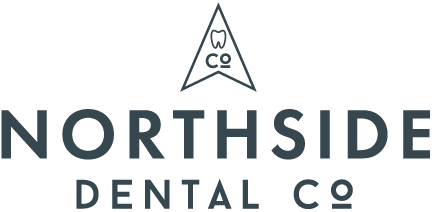Losing teeth is challenging and frustrating. It can be a painful situation that inhibits your normal eating or talking habits, leaving you with diminished mouth and biting function and potential embarrassment.
Have you lost some or all of your teeth? Are you wondering how to replace them? Do you know about dentures and the denture options available to you?
Whether you need to replace a full mouth of teeth or just a few teeth, there are many different types of dentures and denture styles that exist to suit your needs.
In this article, we’re providing expert advice to help you answer questions like “What are the best quality dentures?” and “What’s the best dentures to get?”
Keep reading to learn all about the types of false teeth and which denture options are right for you.
What Are Dentures?
Dentures (or false teeth) are a full or partial set of teeth and made from a plastic material called acrylic resin. Porcelain denture options exist, but they’re often more expensive and more prone to accidental breaks and chips.
Because dentures replace natural teeth, they resemble and function like natural teeth. Dentures restore a portion of your eating function and can also make your smile more complete.
Characteristics that define the different types of dentures are removable, fixed, full, and partial.
Who Needs Dentures?
When most people think of dentures, they think of a complete set of false teeth worn by someone who has lost all their natural teeth. This is true, but dentures are also for those who have only lost a few teeth.
Losing teeth isn’t ideal, but it’s also not uncommon. According to an NIH study, adults aged 20-64 are missing an average of three teeth.
Reasons for tooth loss vary but is most commonly related to:
- Periodontitis (gum disease)
- Poor oral care
- Severe tooth decay
- Facial or jaw injury
- Age
If you’ve lost teeth for any of these reasons, then dentures might be a good option for you. Dentures will restore most of your mouth function and can refresh your confidence in your teeth.
What are the Different Kinds of Dentures?
The first step in the denture process is talking with your dentist. Depending on your current mouth condition, finances, and goals, your dentist will suggest different denture styles.
Mouth conditions that will affect your denture options are:
- Number and location of remaining teeth
- Present tooth and gum health
- Age and lifestyle
If your dentist thinks you’re a candidate for dentures, they’ll talk to you about your current situation and which dentures are suitable for your mouth.
Below is a list of the three most common denture styles to help you get an initial taste (pun intended!) of what options exist.
Full Mouth Dentures
Full mouth dentures are also called complete dentures or full dentures.
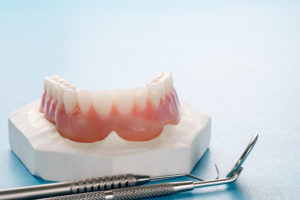 As the phrase, “full mouth” suggests, these types of dentures are a top and bottom set of dentures inclusive of all teeth.
As the phrase, “full mouth” suggests, these types of dentures are a top and bottom set of dentures inclusive of all teeth.
Some advantages of complete dentures are that:
- They’re removable.
- They’re entirely customized.
- They resemble the appearance of natural teeth.
- They restore some chewing capabilities.
You can expect some differences with full dentures compared to natural teeth, such as:
- They provide less chewing force than natural teeth.
- Their thick material covers the palate and can cause a lisp.
- They need to be removed and cleaned daily (natural teeth also need to be cleaned daily, but you don’t need to “remove” them).
Complete tooth loss is most commonly related to age, so elderly adults aged 65+ in the Richmond area are an ideal candidate for a new set of false teeth.
Implant-Retained Dentures (Overdenture)
Implant-retained dentures (IRDs) are becoming the gold standard of denture treatment. Like full mouth dentures, they’re removable and can replace a full set of teeth.
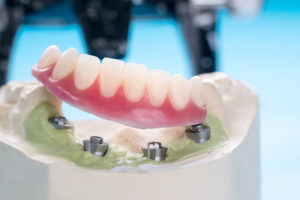
Instead of resting on your gums like complete dentures, IRDs snap into two titanium implants that are placed into your mandible (jaw). This increases stability and chewing function compared to conventional dentures, but still allows the denture to be removed for cleanings and maintenance.
Implant-retained dentures are more expensive than traditional full mouth dentures, require surgery to place the implants, and will need to be removed and cleaned regularly.
However, IRDs provide a valuable alternative to traditional complete dentures.
Removable Partial Dentures
Removable partial dentures (RPD) are another type of denture. Unlike full mouth dentures, RPDs only replace a few missing teeth. But like complete dentures, RPDs are made to look and feel like natural teeth and as the name suggests, are removable.
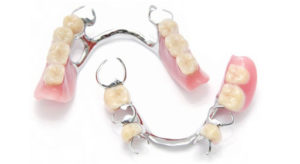
The one caveat with RPDs is they require that your mouth still contains several healthy, natural teeth.
RPDs are made by fixing fake teeth on top of a gum-colored plastic base (often attached to a metal frame, but not always). This base is placed in the mouth where tooth loss has occurred and attached to surrounding natural teeth for stability (which is why having existing teeth is a must for RPDs).
Anyone who only has a few missing teeth but still contains a few natural ones is a candidate for an RPD. They’re also a potential fit for someone who can’t or doesn’t want to get a dental (implant-supported) bridge (more expensive option).
Fixed Partial Dentures (Implant-Supported Bridge)
Implant-supported bridges and fixed partial dentures (FPD) are used interchangeably. They’re best for people who only have a few missing teeth and are looking for a permanent denture.
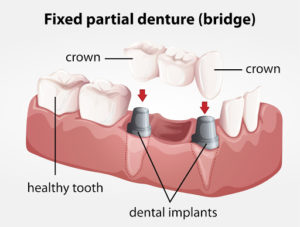 Here are some quick facts and benefits of FPDs:
Here are some quick facts and benefits of FPDs:
- They don’t come out (fixed to your teeth).
- They look and feel like natural teeth.
- They require that you still have natural teeth.
- They’re stronger than removable false teeth.
- They have consistent tooth positioning and better bite.
FDPs have many benefits, but they do require that you have some healthy, natural teeth still in your mouth.
How Much Do Dentures Cost?
Finding and getting the best dentures will involve knowing time and cost for each type of dentures. Your dentist can give you a precise estimate based on your mouth and insurance plan, but at a high level, here’s what you can expect:
| Type of Dentures |
Time |
Cost |
| Removable Partial | 5 weeks | $ |
| Bridge (Fixed Partial) | 2 weeks | $$ |
| Implant Retained Dentures | 6+ months | $$$ |
| Full Mouth | 6-8 weeks | $$ |
Where to Explore the Different Types of Dentures
Whether you need full mouth dentures or partial dentures, there are denture options for you. The right denture styles are different for everyone and are contingent on your current mouth conditions. Your dentist can help you better understand your current situation and what are the best quality dentures for you.
If you’ve lost teeth and have been thinking, “What types of false teeth are there?” we hope this article was helpful. It might be even more useful to talk directly to a denture specialist.
Here at Northside Dental Co., we’re dental experts ready to assist you. Whether you have questions about your existing dentures or are looking to get new dentures, we’ll provide professional direction every step of the way. Our friendly staff and highly-trained dentist can help you make a decision that’s right for you.
Book an appointment online, or give us a call to talk with our staff and start exploring different types of dentures for yourself today!
